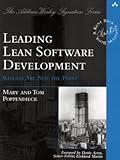- Someone already mentioned Neil Gaiman's "American Gods", but it's so good, I'll mention it again :) Very well constructed and has its specific atmosphere...
- Anything by Iain Banks - "Walking on glass", "Wasp factory", "A song of stone" are definitely not light reading, but worth spending some time on them. His science-fiction is much simpler, but... didn't get me as excited as "Walking on glass".
Non-fiction:
- "Leading Lean Software Development - Results are not the point" (http://www.amazon.com/Leading-Lean-Software-Development-Resu...) is the best team / organisation / project leading book I've seen. I hate most of books like that with passion, but this one is different. I can't wait for the next story they introduce in every chapter. It touches many topics useful for anyone working with even one other person and you can read it like a good adventure book - it's got clear examples, interesting quotes and in-depth but not boring analysis.


https://chrisgagne.com/1255/mary-poppendiecks-the-tyranny-of...
And there's a better telling of it in her excellent book:
http://www.amazon.com/Leading-Lean-Software-Development-Resu...
This makes a ton of sense to me; the American culture around plans is thoroughly fucked.
In software, otherwise reasonable people expect me to give them numbers at the drop of a hat. When will this be done? What will it cost? What will our revenues be for the next 5 years? When I tell them I have no data for numbers like that, they will ask again, as if they thought I hadn't quite heard the question.
When I make it clear that although I'm glad to do real estimates I won't just make up numbers, they get mad. They need numbers! [No, they don't. They want them, often for political reasons.] Other people have given them numbers! [I am not other people.] This is how everybody does it! [Thanks, I've seen the stats on how well that works.] I should just give some ballpark numbers! Nobody will take them seriously! [Except they always, always, always turn into real numbers.] It makes me crazy.
For years, I kept thinking that if I just explained it well, people would come around. But I've come to believe that the root problem here is a managerialist culture, where power matters more than expertise or professional responsibility. Managers want numbers, so managers get numbers. They don't actually help, but managers get to feel in control. If it all happens to work, they're brilliant managers. And if it doesn't, the blame falls upon the people who gave them the numbers, or the people who failed to execute according to the always-impossible plan.
Now I just look for people and work cultures that are focused on actual results and are comfortable with bottom-up power structures.